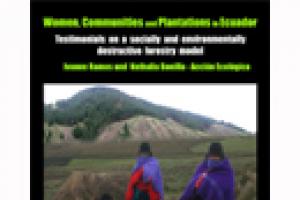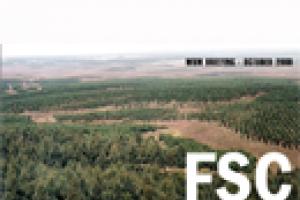The undersigned wish to urge members of the Forest Stewardship Council (FSC) to urgently resolve the serious problem of FSC certification of monoculture tree plantations, at the FSC general assembly to be held in Cape Town, South Africa.
One of the topics for discussion at the general assembly is a Review of FSC Principles and Criteria, and there is therefore an opportunity for changing those principles in such a way as to exclude the certification of monoculture tree plantations by FSC.
Large-Scale Tree Plantations
Industrial tree plantations are large-scale, intensively managed, even-aged monocultures, involving vast areas of fertile land under the control of plantation companies. Management of plantations involves the use of huge amounts of water as well as agrochemicals—which harm humans, and plants and animals in the plantations and surrounding areas.
Other information
29 October 2008
In defence of Human Rights, Food Sovereignty, Biodiversity and Climate Justice
Ironically, on 16 October 2008, World Food and Food Sovereignty Day, a meeting will start in Cartagena (Colombia) to promote monoculture oil palm plantations, that are precisely the cause of so many violations of the Right to Food and contrary to food sovereignty insofar as they undermine the peoples’ right to produce their own food according to their territorial conditions and their food culture.
Other information
29 October 2008
Agrofuels have been presented as the solution to the climate crisis and as a "clean" alternative to fossil fuels. But in reality they are neither "green" nor environmentally friendly, no matter how international financial institutions (such as the World Bank and the Inter-American Development Bank, among others) and transnational corporations would like to promote them.
Bulletin articles
26 October 2008
A pulp mill seriously alters the micro-region where it is installed and generates a series of problems that mainly affect traditional peoples.
Bulletin articles
26 October 2008
It has been 63 years after Soekarno-Hatta proclaimed the independence of the Indonesia Republic on August 17, 1945. Every August especially on the 17th, Indonesians all along the archipelago celebrate this nation's anniversary.
Bulletin articles
26 October 2008
Oil palm firms are making a fortune in Malaysia particularly with the current agrofuel rush. But none of it goes to those who put their blood and flesh to make the money come out from oil palm plantations (see WRM Bulletin Nº 134). Migrant workers from Indonesia appear to be among those who get the worst deal.
Bulletin articles
26 October 2008
It seems like a slap in the face. The oil palm agro-industry has chosen precisely 16 October, World Food Sovereignty Day, and the Latin American country most hit by oil palm – Colombia – to hold the first Latin American meeting of the “Roundtable on Sustainable Palm Oil.”
Bulletin articles
26 October 2008
Arguments in favour of certification often explain that a company wanting to sell its products as sustainably produced has to have some way of proving this. A consumer who wants to buy socially and environmentally friendly products needs a label that they can trust on the products. When the problem is framed in this way, certification seems to be the obvious answer. But the certification of timber products provides three lessons that are important in any consideration of whether certification of agrofuels might help to prevent the worst excesses of a destructive industry.
Publications
22 October 2008
By Ivonne Ramos and Nathalia Bonilla
Testimonials on a socially and environmentally destructive forestry model
Joint Research of Acción Ecológica and WRM
Women, Communities and Plantations in Ecuador
Publications
15 October 2008
Plantations are monocultures, created from seemingly endless rows of identical trees. They suck the water out of nearby streams and ponds and lower the water table, leaving little or no water for people living near the plantations. They deplete soils, pollute the environment with agrotoxics and eradicate biodiverse local ecosystems. Activists in Brazil call them the green desert because of the way they destroy local people's livelihoods and environments.
Bulletin articles
27 September 2008
All “international days” concern problematic issues of global importance that need to be addressed by society as a whole. The expansion of tree monocultures has resulted in so many social and environmental impacts that it gave rise to the idea of establishing an International Day to raise the issue at the global level. The date of September 21st was chosen following the lead from local networks in Brazil, who in 2004 decided to establish this date –which is Tree Day in that country- as a day of struggle against tree monocultures.
Bulletin articles
27 September 2008
Depletion of water sources, changes in flora and fauna, loss of land, human rights violations, destruction of the social fabric: these are just some of the problems brought about by tree monocultures.
Those who know more about this than anyone else are the local communities who have suffered this invasion first hand, but whose protests and struggles are systematically silenced by powerful corporations and their allies.




